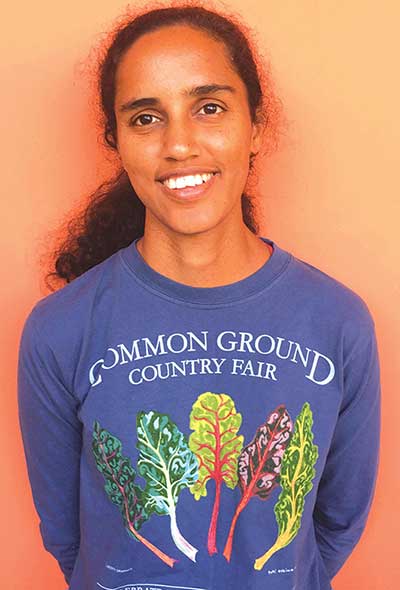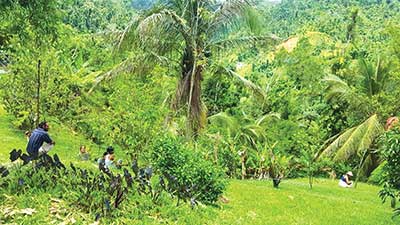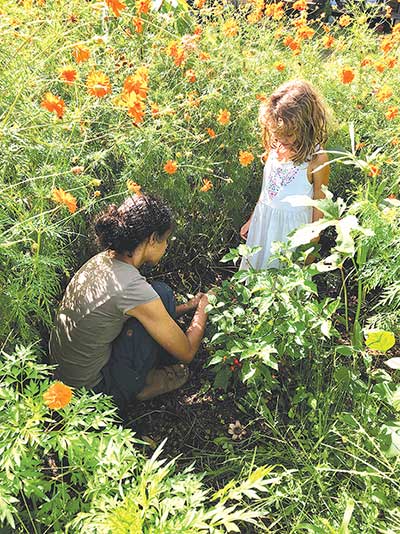 |
| Yanna Mohan Muriel is helping plan a farmer to farmer conference in Puerto Rico. Photo courtesy of Alexandra May. |
 |
| A work brigade organized by Organización Boricuá for Samnyasin La Finca, the farm where Muriel was raised. Photo courtesy of Yanna Mohan Muriel. |
 |
| Muriel and her daughter found earthstar fungi on Finca Marisol while observing soil health. Photo courtesy of Yanna Mohan Muriel. |
By Alexandra May and Yanna Mohan Muriel
Yanna Mohan Muriel is a Puerto Rican farmer and activist who attended MOFGA’s 2018 Farmer to Farmer Conference. She grew up on a farmstead in the central Puerto Rican highlands, where her Trinidadian mother and African American father had moved as back-to-the-landers in the 1980s. While attending Bowdoin College in the early 2000s, Muriel worked at Jill Agnew’s Willow Pond Farm in Sabattus. Muriel is part of a group of Puerto Ricans planning to host a Farmer to Farmer Conference on the island in December 2019 to commemorate the 30th anniversary of the founding of Organización Boricuá de Agricultura Ecológica (Boricuá Organization of Ecological Agriculture). In March 2019 I spoke with Muriel in San Juan, Puerto Rico.
A: What is the history of your personal relationship to farming?
Y: We moved from St. Thomas, Virgin Islands, to Puerto Rico and the farm when I was five. It was a coffee plantation, so I spent the next five to seven years picking and selling coffee. We had farming in our local public school. It was a requirement. I really liked the course. I was a member of the school’s Future Farmers of America chapter and participated in the competitions. Although the teacher was passionate about agriculture, it was conventional. We would pick coffee at school and get a check for the little coffee we picked as an incentive.
It was in the school where I remember seeing the transition from shade-grown coffee to full sun exposure, when the U.S. Department of Agriculture ordered all shade trees be taken down because they thought the coffee would give a higher yield without shade.
A: Did that transition take place on your farm as well?
Y: No. Perhaps because my dad previously worked in Washington, D.C., and had seen institutional corruption, he had very little faith in government; he wanted to be out of the system – not seen, anonymous. Local farmers kept us informed. When my family bought the farm, we stopped using Roundup [herbicide]. Neighbors would tell us that Roundup made farming much easier, not to have to cut with a machete. Although my dad rejected the poison, he accepted the inorganic chemical fertilizer. Coffee was sold and fertilizers were offered by the government. Later we used bat guano and cow manure, because our neighbor kept his cows on our farm since we did not use Roundup.
A: What did you study in college?
Y: When I attended Bowdoin College, I double majored in Latin America studies and Spanish and minored in education. I wanted to dive into what was happening in Puerto Rico, but it was difficult. There was information about Haiti, Brazil and other countries but not much about Puerto Rico.
However, another of my formative experiences came right after I graduated from high school. I met an Indian ethnobotanist named Keshava Bhat. He is considered the father of tropical herbal medicine. His message was to become more self-sustainable when it came to our medicine. In Puerto Rico there is a culture of going to the hospital for anything and everything. Much of our traditional herbalism has been lost. With Bhat, I first heard the Hippocrates quote, “Let food be your medicine and medicine be your food.”
Keshava Bhat went on to give a course at University of Puerto Rico at Rio Piedras, and I studied with him there. At the end of the course, I went with him to Venezuela. The government there had given him about 2,000 acres of Amazon land to set up an eco-village. They put me in charge of farming. I stayed for six months. That really inspired me. That happened before I went to college, so I took with me the idea that working with plants relates to sovereignty.
A: Describe the current landscape of farming and food sovereignty in Puerto Rico.
Y: A group of people within the organic farming movement understands that growing our own food is a way for us to become more independent. As a territory of the United States, Puerto Rico is one of the few Latin American regions that has not achieved sovereignty. It is hard to come to terms with that identity. That has been a long struggle. In terms of young farmers, I have seen this movement grow.
We need to talk about the seed. Since there has been a disconnect from the land after the industrial period, we lost our local seed. The farmers need time to get the seeds adapted and to develop our own. For instance, we are beginning to see lots of quality tomatoes. They do not have blemishes and are consistent. That is something we need to see with all our crops. I don’t think we talk enough about this, but it is something that needs to happen.
We are blessed to have our own organic seed company, Desde Mi Huerto (www.desdemihuerto.com), which has a partnership with High Mowing Seeds. It has been around for a long time and is very accessible and widely available.
A: How would you like to see the farm/food landscape in Puerto Rico change?
Y: I would like to see farmers have a better quality of life, where farming becomes sustainable for farmers. And more markets. I think people have the awareness that the food they are eating from supermarkets and fast food restaurants is not good, but they have very limited access.
A: You and Miguel Marxuach attended MOFGA’s Farmer to Farmer Conference last fall and plan to hold something like that in December 2019. What inspired you at MOFGA’s conference?
Y: I remember going on MOFGA’s website and seeing about this conference and really feeling excited. That was years ago. When I went last fall, it was exactly what I expected. It is a space with a lot of community and sharing, even outside of the organized presentations. I could see that after a season of so much hard work, people were excited to come together, to get re-energized and inspired by each other.
A: How will a Farmer to Farmer Conference for Puerto Rico look different?
Y: I have the feeling that our movement in Puerto Rico tends to be more political, which has to do with our political status – we are a colony. So when we are designing our Farmer to Farmer, we are going to leave a lot of space to touch upon that. I am not sure what that will look like, but we are part of La Via Campesina, and a lot of people follow Cuba’s organic movement. So I think there will be part of that at the conference, but the vision is what we saw at MOFGA’s Farmer to Farmer. I think we won’t get there this year, but it is something we will build over time.
One concern I have is the competitive nature of farmers here. I think it is a lack of communication and understanding. If we don’t know what is happening, then ideas are fabricated. I don’t think there is an understanding that there is space for all of us to participate in the marketplace and in education. One of our main objectives for the Farmer to Farmer Conference is to bring back solidarity, collaboration and unity.
A: How far are you casting the net for the conference? Is there interest and support for conventional farmers wanting to transition to organic?
Y: All Boricua’s (https://organizacionboricua.blogspot.com/p/quienes-somos.html) activities and events are open to everybody, and we have seen people make the transition, but we do not have programs designed specifically for conventional farmers. The USDA NRCS does have a program in Puerto Rico. I would say in our country there is a divide between small-scale, organic farmers and conventional farmers. In the middle we have subsistence farmers – traditional farmers – and the farm laborers. They [subsistence farmers] do not make a whole lot of money from farming – they are not commercial. Whatever they have in excess they might take to a local stand or give away or exchange. These subsistence farmers might use some chemicals on their fields but not a lot. Those are the people who might want to transition. The big conventional are commercial; they are not all interested in organic.
A: What have we not touched upon that you would like to mention?
Y: GMO is something we are worried about. The other day I had a conversation with Maria Benedetti, an ethnobotanist leading an effort to ban glyphosates. She said that Pioneer [a seed company owned by DowDuPont] is opening an office in the town of Aibonito. The GMO companies have taken over the southern coast, but now they are moving into the center, the mountainous areas. So these are new developments. Sometimes I read the news and try to figure out what is going on, and sometimes I stay away because it is really hard and depressing; it is huge. The government supports their use and gives incentives – over $526 million in the last decade (“A Corporate Welfare Red Carpet Propels GMO Seed Companies in Puerto Rico,” by Eliván Martínez Mercado, Centro de Periodismo Invetigativo, March 18, 2017). These companies are allowed to use water, while many small farmers don’t have access to that water. These are issues that generate frustration and resentment.
A: For many people outside of Puerto Rico, Hurricane Maria is forward in their minds. Do you want to say anything for this audience about the impact of Maria?
Y: We are dealing with it every day. I went to our farm last Thursday and I left depressed; I was worried. I had never seen the water level of the river that low at this time of year. I know it is because we lost our [tree] canopy in the hurricane. The underground water is less, the superficial water and springs are drying up faster than they would if we still had the canopy protecting them. I don’t hear people talking about this – I wish we would.
While we are dealing with Maria every day, we are not panicking, because we are a group of people who have learned how to be resilient. We built ourselves outside of the system. Our founders in the small farm movement banged on governmental doors and demanded the same kind of rights and incentives for the organic farming sector, and those doors were never opened. And so they started to build a parallel system. I firmly believe that is what we are all doing. We are not panicking because we have learned how to do this with the little we have. With Maria the system collapsed, but we did not depend on that system. Nevertheless, lessons were learned, and we lived a traumatic experience.
A farmer is an artist. When you rebuild a house, it gets done, but a farm is never done; it is a working project of constant redesigning and adjusting to meet a vision. The hurricane was very destructive, but if you visit our farms today, you will see evidence of rebuilding, replanting, work and dedication. It truly is inspirational.
About the author: Alexandra May and her husband, Sam, a MOFGA board member, have traveled to Puerto Rico over the past few years. They feel fortunate to have met many wonderful Puerto Ricans who are working to further food sustainability and organic farming on the island.
